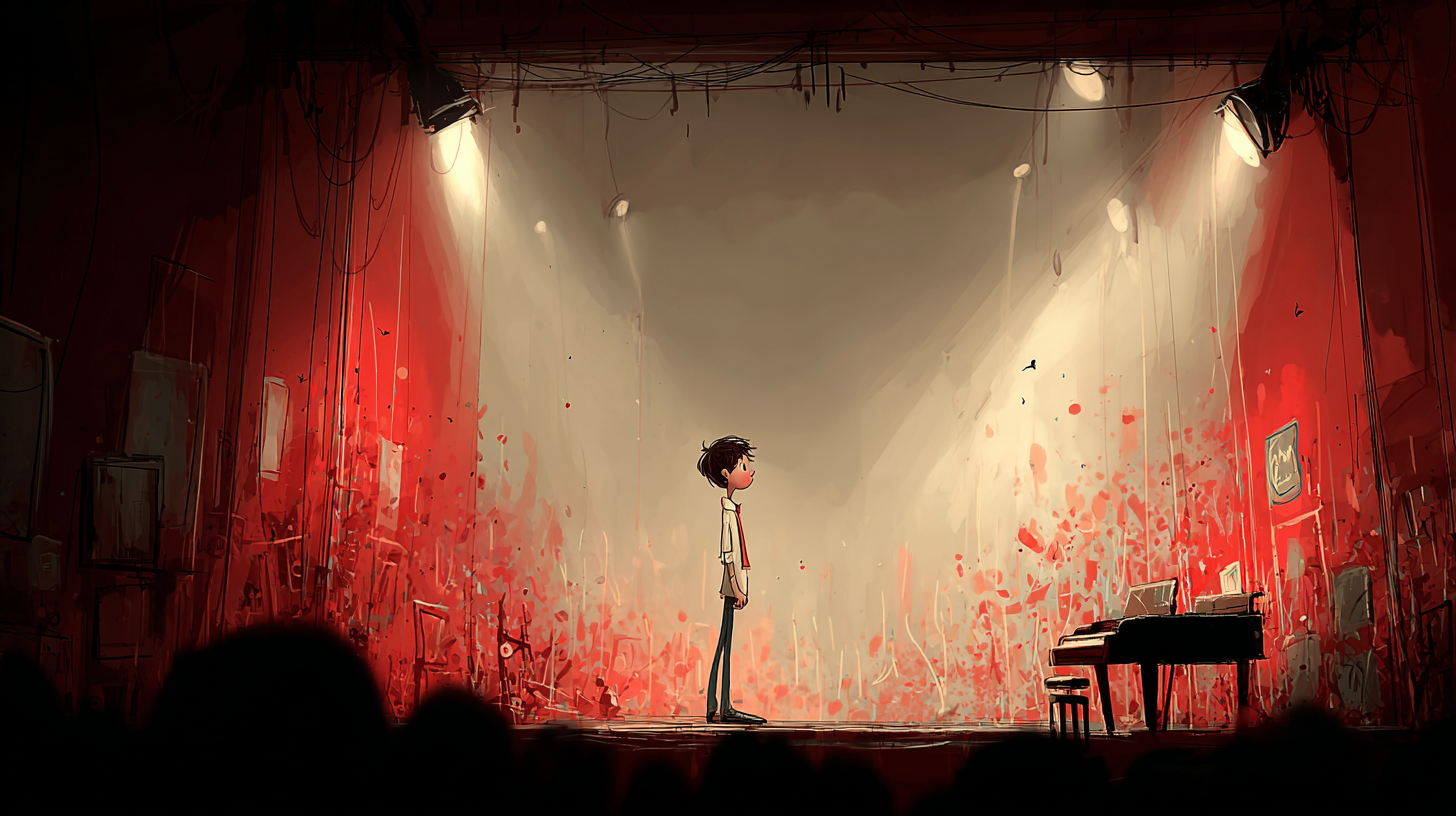“Cast” means to throw, to choose actors, to make light or shadow, or the group of actors, or a hard cover for a broken bone.
「cast」は「投げる」「役を決める」「光や影を落とす」「出演者」「ギプス」という意味を持つ。
以下は英単語 “cast” に関するストーリー型学習コンテンツです。まずは大枠の意味を理解して最後の文章で確認しましょう。
主な意味(main meaning)
| 品詞 | 発音記号 | 意味(簡潔) | 英語例文 |
|---|---|---|---|
| 動詞 (verb) | /kæst/ | 投げる、投じる | He cast a stone into the river. |
| 動詞 (verb) | /kæst/ | 役を与える(配役する) | The director cast her as the main character. |
| 動詞 (verb) | /kæst/ | 光・影を投げかける | The tree cast a shadow on the ground. |
| 名詞 (noun) | /kæst/ | 出演者、配役 | The cast of the play was excellent. |
| 名詞 (noun) | /kæst/ | ギプス(骨折用の固定具) | He wore a cast on his arm after the accident. |
語源(etymology)
「cast」は古ノルド語 kasta(投げる)から来ており、もともとは「放り投げる」というイメージが中心。そこから「役を与える」「光や影を投げる」などに意味が広がった。
類義語(synonyms)
| 類義語 | 意味 | 例文 |
|---|---|---|
| throw | 投げる | He threw the ball to his friend. |
| toss | 軽く投げる | She tossed the keys onto the table. |
| assign | 割り当てる、任命する | The teacher assigned homework to the students. |
| choose | 選ぶ | They chose him as their leader. |
反義語(antonyms)
| 反義語 | 意味 | 例文 |
|---|---|---|
| catch | つかむ | She caught the ball with one hand. |
| keep | 保つ、持ち続ける | He kept the secret for many years. |
コロケーション(collocations)
| コロケーション | 例文 |
|---|---|
| cast a vote | Many citizens cast a vote in the election. |
| cast a spell | The wizard cast a spell on the village. |
| cast light on | The report cast light on the problem. |
| cast doubt | His answer cast doubt on his honesty. |
| cast a shadow | The mountain cast a shadow over the valley. |
2項表現(binomials)
| 2項表現 | 例文 |
|---|---|
| cast and crew | The cast and crew worked hard to finish the movie. |
| trial and error | We learned through trial and error. |
英語ストーリー(english story)
Story: “The Unexpected Role”
Last summer, a small town theater prepared for its annual play. The director, Mr. Green, wanted to cast (choose actors) the roles carefully, because the play was very important to the town. Many students from the local high school came to audition. Among them was David, a shy boy who never spoke much in class.
At first, Mr. Green thought David would be too nervous. However, when David began reading the lines, he surprised everyone. His voice was clear and strong. The director immediately decided to cast him as the main character. The rest of the cast (actors) also welcomed David warmly.
The group of cast and crew worked hard every day. They learned their lines through trial and error, fixing mistakes together. Sometimes David felt insecure, but his friends encouraged him. One day, while practicing outside, David accidentally tripped and broke his arm. He had to wear a cast (hard cover for a broken bone).
At first, David thought he could not continue. But Mr. Green told him, “Do not give up. Even with a cast on your arm, you can still act.” The others agreed.
On the night of the performance, the stage lights cast a shadow on the floor as David stood in front of the audience. He felt nervous, but he remembered all his practice. His performance was excellent. The play was a success, and many people from the town praised him.
Later, when David remembered the experience, he realized it had taught him an important lesson. Sometimes life will cast doubt on your abilities, but with courage and support, you can shine.
和訳
ストーリー和訳:「思いがけない役」
去年の夏、小さな町の劇場で毎年恒例の劇の準備が始まりました。演出家のグリーンさんは、劇が町にとってとても大切だったので、役を慎重に**cast(配役する)**しようと思っていました。地元高校からたくさんの生徒がオーディションに来ました。その中に、クラスではあまり話さない内気な少年デイビッドがいました。
最初、グリーンさんはデイビッドは緊張しすぎるだろうと考えていました。しかし、デイビッドが台詞を読み始めると、みんなを驚かせました。声ははっきりして力強かったのです。監督はすぐに、彼を主役に**cast(配役する)することに決めました。ほかのcast(出演者)**も温かくデイビッドを迎えました。
**cast and crew(出演者とスタッフ)は毎日一生懸命練習しました。彼らはtrial and error(試行錯誤)を通じて台詞を覚え、間違いを直しました。デイビッドは時々不安になりましたが、友達が励ましてくれました。ある日、屋外練習のとき、デイビッドは転んで腕を骨折してしまいました。彼は腕にcast(ギプス)**をしなければなりませんでした。
最初、デイビッドはもう続けられないと思いました。しかし、グリーンさんは言いました。「あきらめてはいけない。腕に**cast(ギプス)**をしていても、演技はできるよ。」他の人たちも賛成しました。
本番の夜、ステージのライトが床に**cast a shadow(影を落とす)**と、デイビッドは観客の前に立ちました。彼は緊張していましたが、練習を思い出しました。彼の演技はすばらしく、劇は大成功でした。町の人々もたくさん彼を褒めました。
後でデイビッドは、この経験が大切なことを教えてくれたと気づきました。人生はときどきあなたの力に**cast doubt(疑いを投げかける)**かもしれません。しかし勇気と仲間の支えがあれば、あなたは輝けるのです。
Q&A
Q: 「cast」と「throw」の違いは何ですか?
A: 「cast」は「狙って投げる」よりも「放り投げる、投じる」というニュアンスがあります。文学的・比喩的にもよく使われます。一方「throw」は最も一般的で、単純に「投げる」という意味です。
Q: 「cast」と「toss」の違いは?
A: 「toss」は「軽く投げる」という意味で、カジュアルな場面で使われます。例えば「鍵を軽くテーブルに投げる」などです。「cast」は「光を投げる」「呪文をかける」など抽象的な使い方も多いです。
Q: 「cast」と「assign」の違いは?
A: 「assign」は「仕事や役割を正式に割り当てる」という意味で、学校や職場でよく使います。「cast」は「役を与える」という意味ですが、演劇や映画の文脈に限られます。
Q: 「cast」と「choose」の違いは?
A: 「choose」は「選ぶ」という一般的な意味を持ちます。「cast」は特に「俳優や役を選ぶ」ときに使う専門的な表現です。
Q: 「cast a vote」と「vote」の違いは?
A: 「vote」は単純に「投票する」です。「cast a vote」は「一票を投じる」という少しフォーマルな言い方で、選挙など公式の場でよく使われます。
Q: 「cast a spell」と「spell」の違いは?
A: 「spell」は「呪文」そのものを意味します。「cast a spell」は「呪文をかける」という動作を表します。
Q: 「cast light on」と「light」の違いは?
A: 「light」は「光」そのものを意味します。「cast light on」は「光を当てる」という動作で、比喩的に「問題を明らかにする」という意味でも使います。
Q: 「cast doubt」と「doubt」の違いは?
A: 「doubt」は「疑い」「疑うこと」そのものを表します。「cast doubt」は「疑いを投げかける」「信頼を揺るがす」という比喩的な表現です。
Q: 「cast a shadow」と「shadow」の違いは?
A: 「shadow」は「影」そのものです。「cast a shadow」は「影を落とす」という動作を表し、比喩的に「暗い影響を与える」という意味にも使えます。



コメント